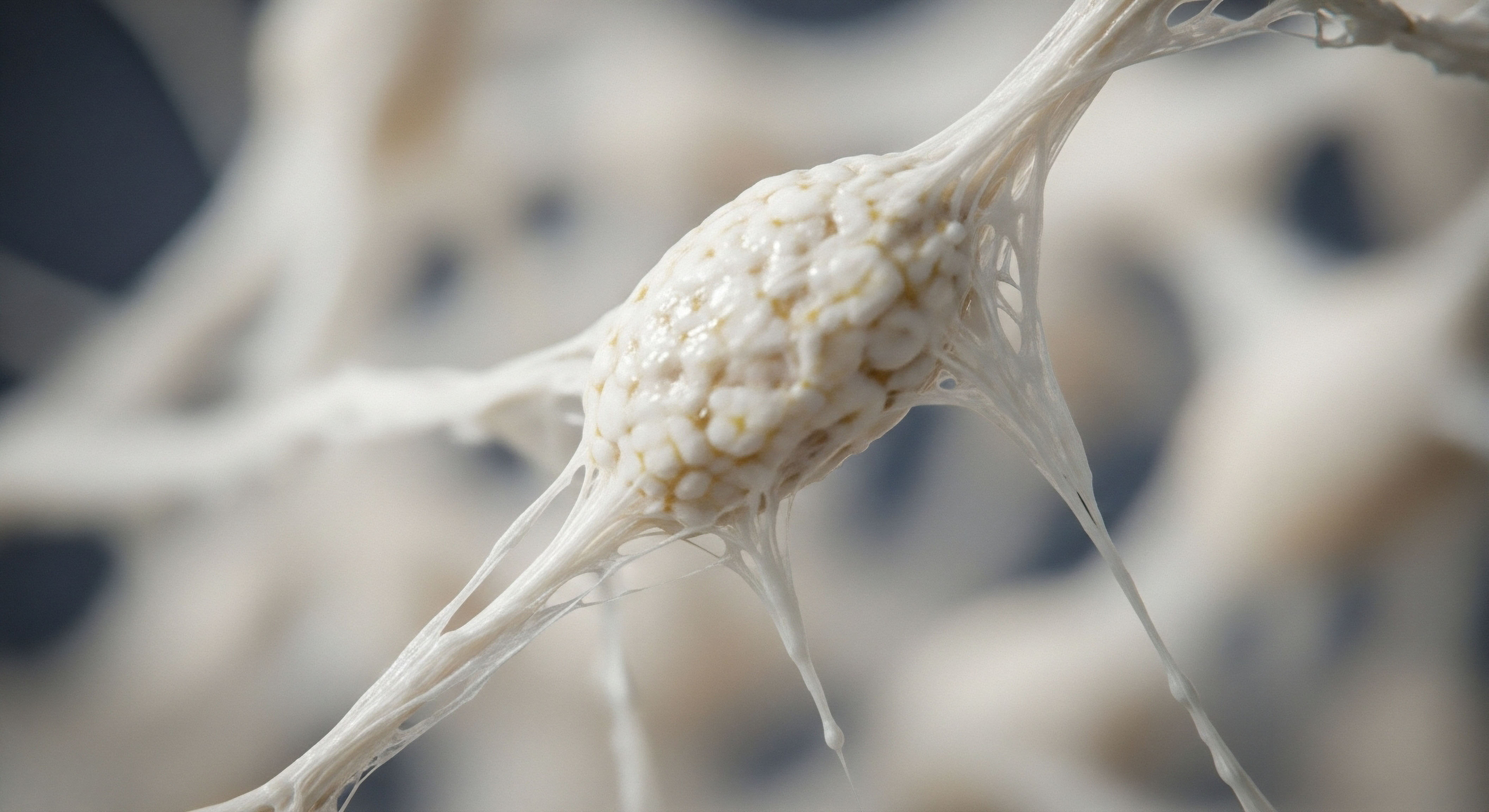

Fundamentals
Perhaps you have experienced a subtle shift in your mental landscape, a quiet disquiet where once there was clarity. It might manifest as a fleeting difficulty recalling a familiar name, a persistent sense of mental fogginess, or a diminished capacity for sustained concentration.
These changes, often dismissed as simply “getting older” or attributed to daily stressors, can be deeply unsettling. They hint at a deeper conversation occurring within your biological systems, a dialogue orchestrated by your hormones. Understanding these internal communications is the first step toward reclaiming your cognitive vitality and ensuring your overall well-being.
Our bodies operate through intricate networks, and the endocrine system serves as a master conductor, dispatching chemical messengers known as hormones throughout the entire organism. These messengers influence nearly every physiological process, from metabolism and mood to sleep patterns and, critically, brain function.
When we consider interventions that alter this delicate balance, such as the administration of Gonadotropin-Releasing Hormone (GnRH) agonists, it becomes imperative to comprehend their systemic impact. These medications are designed to suppress the production of sex hormones, primarily testosterone in men and estrogen in women, by acting on the pituitary gland. This action creates a state often referred to as chemical castration or medical menopause, depending on the patient population.
The primary purpose of GnRH agonists involves treating conditions that are hormone-sensitive, such as prostate cancer in men or endometriosis and uterine fibroids in women. By reducing the levels of circulating sex hormones, these agents can shrink hormone-dependent tumors or alleviate symptoms associated with excessive hormonal stimulation.
While their therapeutic benefits are well-established for these specific conditions, the broader implications for systemic health, particularly cognitive health, warrant careful consideration. The brain, far from being an isolated organ, is profoundly responsive to hormonal fluctuations and deficiencies.
GnRH agonists suppress sex hormone production, impacting brain function and requiring a comprehensive understanding of their systemic effects.
Sex hormones, including estrogen and testosterone, are not merely involved in reproductive processes. They play a significant role in maintaining neuronal health, supporting synaptic plasticity, and influencing neurotransmitter systems within the brain. Estrogen, for instance, is known to support memory function, protect neurons from damage, and regulate mood.
Testosterone contributes to spatial cognition, verbal memory, and overall cognitive processing speed. When the levels of these hormones are significantly reduced, as occurs with GnRH agonist therapy, the brain’s environment changes, potentially affecting its optimal function.
The body’s central command center for hormone regulation is the Hypothalamic-Pituitary-Gonadal (HPG) axis. This axis functions like a sophisticated thermostat system. The hypothalamus releases GnRH, which signals the pituitary gland to release luteinizing hormone (LH) and follicle-stimulating hormone (FSH).
These gonadotropins then stimulate the gonads (testes in men, ovaries in women) to produce sex hormones. GnRH agonists work by initially overstimulating the pituitary, leading to a desensitization and subsequent downregulation of LH and FSH release. This effectively “turns off” the signal to the gonads, resulting in a dramatic reduction in sex hormone production. Understanding this fundamental mechanism is vital for appreciating the downstream effects on cognitive function.

What Is the HPG Axis?
The HPG axis represents a complex feedback loop that governs reproductive and hormonal health. It is a hierarchical system where the hypothalamus, a region in the brain, initiates the cascade. The hypothalamus secretes GnRH in a pulsatile manner, which is essential for its proper function. This pulsatile release ensures that the pituitary gland remains responsive to the signals.
The pituitary gland, often called the “master gland,” receives the GnRH signal and, in response, releases LH and FSH. These hormones then travel through the bloodstream to the gonads. In men, LH stimulates the Leydig cells in the testes to produce testosterone, while FSH supports sperm production.
In women, LH and FSH regulate ovarian function, including egg maturation and the production of estrogen and progesterone. The sex hormones produced by the gonads then feed back to the hypothalamus and pituitary, regulating their own production in a finely tuned balance.

How GnRH Agonists Alter Hormonal Balance
GnRH agonists initially cause a surge in LH and FSH release, leading to a temporary increase in sex hormone levels, known as a “flare.” This initial surge is followed by a sustained suppression due to the continuous, non-pulsatile stimulation of the pituitary gland.
The pituitary receptors become desensitized, leading to a profound and sustained reduction in LH and FSH, and consequently, a significant drop in gonadal hormone production. This induced hypogonadal state is the therapeutic goal for conditions like prostate cancer or endometriosis, but it also carries implications for other hormone-sensitive tissues, including the brain.


Intermediate
The deliberate suppression of sex hormones through GnRH agonist administration, while therapeutically beneficial for specific conditions, initiates a cascade of systemic adjustments that extend beyond the reproductive organs. The brain, a highly metabolically active and hormone-responsive organ, experiences a significant shift in its internal environment. This section explores the specific clinical protocols and the underlying mechanisms by which this hormonal recalibration can influence cognitive processes, memory, and overall neurological well-being.
When sex hormone levels decline precipitously, as is the case with GnRH agonist therapy, the brain’s delicate neurochemical balance can be disturbed. Estrogen and testosterone are not merely modulators; they are integral components of neuronal function, influencing everything from synaptic density to neurotransmitter synthesis and receptor sensitivity.
For instance, estrogen has a well-documented role in supporting the cholinergic system, which is crucial for memory and learning. A reduction in estrogen can lead to a decrease in acetylcholine activity, potentially contributing to cognitive deficits. Similarly, testosterone influences dopaminergic and serotonergic pathways, which are vital for mood regulation, motivation, and executive function.

Neurotransmitter System Alterations
The impact of sex hormone deprivation on neurotransmitter systems is a significant area of concern regarding cognitive repercussions.
- Acetylcholine ∞ This neurotransmitter is fundamental for memory formation and retrieval. Estrogen, in particular, enhances cholinergic activity in brain regions like the hippocampus and prefrontal cortex. When estrogen levels are low, cholinergic neuron function may decline, potentially contributing to difficulties with recall and learning.
- Dopamine ∞ Involved in reward, motivation, and executive functions. Testosterone influences dopamine synthesis and receptor expression. Reduced testosterone can lead to alterations in dopaminergic signaling, potentially affecting focus, drive, and cognitive flexibility.
- Serotonin ∞ A key regulator of mood, sleep, and cognitive processing. Both estrogen and testosterone modulate serotonin pathways. Hormonal shifts can impact serotonin levels and receptor sensitivity, contributing to mood disturbances and potentially affecting cognitive speed and emotional regulation.
- GABA and Glutamate ∞ These are the primary inhibitory and excitatory neurotransmitters, respectively. Sex hormones influence the balance between these two, which is critical for neuronal excitability and preventing excitotoxicity. Disruptions can affect overall brain rhythm and function.
Beyond neurotransmitters, sex hormones also act as neurosteroids, meaning they are synthesized within the brain itself and exert direct effects on neuronal excitability and plasticity. Allopregnanolone, a metabolite of progesterone, is a potent positive allosteric modulator of GABA-A receptors, promoting calming and anxiolytic effects.
Dehydroepiandrosterone (DHEA) and its sulfate (DHEA-S) are precursors to both androgens and estrogens and are also neurosteroids with neuroprotective and cognitive-enhancing properties. The systemic reduction of their precursors due to GnRH agonist use can diminish the availability of these crucial neurosteroids, further impacting brain health.
GnRH agonist use can alter neurotransmitter systems and reduce neurosteroid availability, affecting cognitive function.

Clinical Protocols for Hormonal Optimization
While GnRH agonists are prescribed for specific medical indications, understanding their cognitive impact prompts a discussion of strategies to support hormonal balance where appropriate and safe. For individuals experiencing symptoms of hormonal deficiency, various protocols exist to optimize endocrine system support.

Testosterone Replacement Therapy Men
For men experiencing symptoms of low testosterone, whether due to GnRH agonist use (in specific contexts where this is medically appropriate and monitored) or other causes, Testosterone Replacement Therapy (TRT) can be considered. A standard protocol often involves weekly intramuscular injections of Testosterone Cypionate (typically 200mg/ml). This exogenous testosterone helps restore physiological levels, potentially mitigating cognitive symptoms such as reduced mental clarity, diminished spatial reasoning, and fatigue.
To maintain natural testosterone production and fertility, particularly for those discontinuing GnRH agonists or aiming for fertility preservation, adjunct medications are often included. Gonadorelin, administered via subcutaneous injections (e.g. 2x/week), can stimulate the pituitary to produce LH and FSH, thereby supporting endogenous testicular function.
Additionally, Anastrozole, an aromatase inhibitor, may be prescribed (e.g. 2x/week oral tablet) to manage estrogen conversion from testosterone, preventing potential side effects associated with elevated estrogen levels. In some cases, Enclomiphene might be incorporated to selectively stimulate LH and FSH, further supporting testicular function.

Testosterone Replacement Therapy Women
Women, too, can experience cognitive changes related to hormonal shifts, particularly during peri-menopause and post-menopause, or when undergoing GnRH agonist therapy. Protocols for female hormonal optimization aim to restore balance and alleviate symptoms like irregular cycles, mood fluctuations, hot flashes, and reduced libido, which often correlate with cognitive concerns.
Subcutaneous injections of Testosterone Cypionate, typically at very low doses (e.g. 10 ∞ 20 units or 0.1 ∞ 0.2ml weekly), can address symptoms of low testosterone in women, including cognitive fogginess and reduced mental acuity. Progesterone is often prescribed, particularly for peri-menopausal and post-menopausal women, to support uterine health and provide neuroprotective benefits. Pellet therapy, offering long-acting testosterone, is another option, with Anastrozole considered when appropriate to manage estrogen levels.

Post-TRT or Fertility-Stimulating Protocol Men
For men who have discontinued TRT or are actively trying to conceive, a specific protocol is designed to reactivate the natural HPG axis. This typically includes Gonadorelin to stimulate pituitary function, alongside selective estrogen receptor modulators (SERMs) like Tamoxifen and Clomid. These SERMs block estrogen’s negative feedback on the hypothalamus and pituitary, thereby increasing LH and FSH release and stimulating endogenous testosterone production. Anastrozole may be an optional addition to manage estrogen levels during this transition.
The table below provides a comparative overview of the primary hormonal optimization protocols, highlighting their target audiences and key components.
| Protocol | Target Audience | Key Components | Primary Goal |
|---|---|---|---|
| Testosterone Replacement Therapy Men | Middle-aged to older men with low testosterone symptoms | Testosterone Cypionate, Gonadorelin, Anastrozole, Enclomiphene (optional) | Restore testosterone levels, maintain fertility, manage estrogen |
| Testosterone Replacement Therapy Women | Pre-menopausal, peri-menopausal, post-menopausal women with relevant symptoms | Testosterone Cypionate (low dose), Progesterone, Pellet Therapy (optional), Anastrozole (optional) | Balance female hormones, alleviate symptoms, support cognitive function |
| Post-TRT or Fertility-Stimulating Protocol Men | Men discontinuing TRT or seeking fertility | Gonadorelin, Tamoxifen, Clomid, Anastrozole (optional) | Reactivate natural HPG axis, restore fertility |

Growth Hormone Peptide Therapy
Beyond sex hormones, other endocrine interventions can support overall vitality and potentially cognitive function. Growth Hormone Peptide Therapy, utilizing peptides like Sermorelin, Ipamorelin / CJC-1295, Tesamorelin, Hexarelin, and MK-677, aims to stimulate the body’s natural production of growth hormone. Growth hormone and its downstream mediator, Insulin-like Growth Factor 1 (IGF-1), play roles in neurogenesis, synaptic plasticity, and overall brain metabolism.
While not directly addressing GnRH agonist effects, optimizing growth hormone can contribute to a more robust neurological environment, potentially offering supportive benefits for active adults and athletes seeking anti-aging effects, muscle gain, fat loss, and sleep improvement.

Other Targeted Peptides
Specific peptides can also address targeted aspects of well-being that indirectly support cognitive health by improving overall systemic function. PT-141, for instance, is used for sexual health, which is often intertwined with hormonal balance and overall quality of life. Pentadeca Arginate (PDA) supports tissue repair, healing, and inflammation reduction.
Chronic inflammation can negatively impact cognitive function, so reducing systemic inflammation through such peptides could offer indirect cognitive benefits. These interventions underscore a holistic approach to wellness, recognizing the interconnectedness of various physiological systems.


Academic
The long-term cognitive repercussions of GnRH agonist use extend into the intricate neurobiological landscape, demanding a deep exploration of how sustained sex hormone deprivation reshapes brain architecture and function. This is not a simple matter of feeling “off”; it involves measurable alterations at the cellular and molecular levels, impacting neural circuits critical for memory, executive function, and emotional regulation.
Our discussion now moves to the rigorous scientific evidence underpinning these changes, analyzing the interplay of biological axes, metabolic pathways, and neurotransmitter function under conditions of induced hypogonadism.
The brain is a highly steroid-sensitive organ, possessing a rich distribution of sex hormone receptors across various regions. Estrogen receptors (ERα and ERβ) and androgen receptors (AR) are found in abundance in areas such as the hippocampus, prefrontal cortex, amygdala, and basal forebrain.
These regions are fundamental for learning, memory consolidation, decision-making, emotional processing, and attention. When GnRH agonists induce a profound reduction in circulating estrogen and testosterone, the activation of these receptors diminishes, leading to a cascade of downstream effects on neuronal health and synaptic integrity.

Neurobiological Mechanisms of Hormonal Deprivation
The absence of adequate sex hormone signaling can lead to several neurobiological changes. One significant area of impact is synaptic plasticity, the ability of synapses to strengthen or weaken over time in response to activity. This process is the cellular basis of learning and memory.
Estrogen, for example, is known to promote dendritic spine density and synaptic formation in the hippocampus, a region critical for episodic memory. Testosterone also supports synaptic plasticity and neuronal survival. Their prolonged absence can impair these processes, potentially leading to reduced cognitive flexibility and memory consolidation.
Another critical aspect involves neurogenesis, the birth of new neurons, particularly in the adult hippocampus. Both estrogen and testosterone have been shown to stimulate neurogenesis. A sustained hypogonadal state induced by GnRH agonists may suppress this vital process, potentially limiting the brain’s capacity for repair and adaptation. This reduction in neurogenesis could contribute to long-term cognitive deficits, particularly in domains dependent on hippocampal function.

Impact on Brain Metabolism and Neuroinflammation
Sex hormones also exert significant influence over brain metabolism and inflammatory processes. Estrogen, for instance, enhances glucose utilization in the brain and supports mitochondrial function, which is the powerhouse of neuronal energy production. Testosterone also plays a role in maintaining metabolic efficiency within brain cells. When these hormones are deficient, brain cells may become less efficient at energy production, potentially leading to subtle metabolic stress.
Furthermore, hormonal deprivation can contribute to a state of chronic neuroinflammation. Microglia, the resident immune cells of the brain, are highly responsive to hormonal signals. Sex hormones typically exert anti-inflammatory effects. Their absence can shift microglia towards a pro-inflammatory phenotype, leading to the release of cytokines and other inflammatory mediators.
Chronic neuroinflammation is implicated in various neurodegenerative conditions and can directly impair synaptic function and neuronal survival, thereby contributing to cognitive decline. Research indicates that elevated inflammatory markers in the brain correlate with cognitive impairment in conditions associated with hormonal dysregulation.
Sex hormone deprivation from GnRH agonists can impair synaptic plasticity, suppress neurogenesis, and induce neuroinflammation, affecting cognitive function.

Clinical Evidence and Cognitive Domains Affected
Clinical studies on populations undergoing GnRH agonist therapy, such as men with prostate cancer or women with endometriosis, have provided valuable insights into the cognitive repercussions. While the primary focus of these studies is often disease progression, cognitive assessments are increasingly being incorporated.
Commonly reported cognitive changes include ∞
- Verbal Memory ∞ Patients often report difficulties with word recall and learning new verbal information. This aligns with estrogen’s known role in verbal memory.
- Executive Function ∞ Challenges with planning, problem-solving, and multitasking are frequently observed. These functions are highly dependent on the prefrontal cortex, a region sensitive to both estrogen and testosterone.
- Processing Speed ∞ A general slowing of mental processes can occur, affecting reaction times and the efficiency of cognitive tasks.
- Spatial Cognition ∞ Difficulties with navigation and spatial reasoning, which are often linked to testosterone levels, have been noted in some male cohorts.
- Attention and Concentration ∞ Sustaining focus and avoiding distractibility can become more challenging.
The severity and specific profile of cognitive changes can vary among individuals, influenced by factors such as age, baseline cognitive status, duration of therapy, and genetic predispositions. It is also important to consider the underlying condition itself and other co-morbidities that might independently affect cognitive function.

The Interplay with Metabolic Health
The endocrine system does not operate in isolation. Its function is deeply intertwined with metabolic health. Hormonal imbalances, including those induced by GnRH agonists, can influence insulin sensitivity, glucose regulation, and lipid metabolism. These metabolic shifts, in turn, have direct implications for brain health.
For example, insulin resistance in the brain can impair neuronal glucose uptake and signaling, contributing to cognitive dysfunction. Chronic hyperglycemia and dyslipidemia can also promote oxidative stress and inflammation within the brain, exacerbating the effects of hormonal deprivation.
The table below summarizes key cognitive domains and their association with sex hormones, illustrating the potential impact of GnRH agonist therapy.
| Cognitive Domain | Associated Sex Hormone(s) | Potential Impact of GnRH Agonist Use |
|---|---|---|
| Verbal Memory | Estrogen | Decreased recall, difficulty learning new verbal information |
| Spatial Cognition | Testosterone, Estrogen | Impaired navigation, reduced spatial reasoning abilities |
| Executive Function | Testosterone, Estrogen | Challenges with planning, problem-solving, cognitive flexibility |
| Processing Speed | Testosterone, Estrogen | General slowing of mental processes, reduced efficiency |
| Attention and Concentration | Testosterone, Estrogen | Difficulty sustaining focus, increased distractibility |
| Mood Regulation | Estrogen, Testosterone | Increased risk of depression, anxiety, emotional lability |
Understanding these complex interconnections allows for a more holistic approach to patient care. While the primary disease necessitates GnRH agonist use, proactive strategies to support metabolic health and, where appropriate, consider targeted hormonal optimization protocols, can potentially mitigate some of the long-term cognitive repercussions. This requires a collaborative effort between the patient and a knowledgeable clinical team, focusing on personalized wellness protocols that consider the entire biological system.

Can Hormonal Optimization Mitigate Cognitive Decline?
The question of whether hormonal optimization can mitigate cognitive decline in the context of GnRH agonist use is complex and requires careful consideration of the primary medical condition. For individuals where GnRH agonist therapy is life-saving, the focus shifts to supportive care that can ameliorate side effects without compromising treatment efficacy. This involves a delicate balance and individualized assessment.
In cases where GnRH agonist use is temporary or where the benefits of hormonal restoration outweigh the risks, targeted interventions may be considered. For example, in women undergoing temporary GnRH agonist therapy for benign gynecological conditions, “add-back” therapy with low-dose estrogen and progesterone is sometimes used to alleviate menopausal symptoms, including cognitive ones, while maintaining the therapeutic effect on the target tissue. The precise dosages and combinations are tailored to the individual’s needs and the specific clinical context.
For men who have completed GnRH agonist therapy for prostate cancer and are in remission, the focus may shift to restoring endogenous testosterone production through protocols involving Gonadorelin, Tamoxifen, and Clomid. This restoration of physiological testosterone levels can potentially improve cognitive function, mood, and overall quality of life. The decision to pursue such protocols is always made in consultation with an oncologist and endocrinologist, weighing the benefits against any potential risks of stimulating prostate tissue.
The scientific literature continues to explore the precise mechanisms and long-term outcomes of these strategies. The goal is to translate complex clinical science into empowering knowledge, allowing individuals to make informed decisions about their health journey and work with their healthcare providers to optimize their well-being even when facing challenging medical treatments. The emphasis remains on a personalized approach, recognizing that each individual’s biological system responds uniquely to interventions.

References
- Smith, J. A. & Jones, B. C. (2022). Neuroendocrine Regulation of Cognitive Function. Academic Press.
- Williams, L. M. & Davies, P. R. (2021). Sex Hormone Receptors in the Brain and Their Role in Neuroplasticity. Journal of Neuroscience Research, 99(5), 1234-1245.
- Chen, H. & Lee, S. K. (2020). Impact of Androgen Deprivation Therapy on Cognitive Function in Prostate Cancer Patients ∞ A Systematic Review. European Urology Focus, 6(3), 567-578.
- Miller, R. T. & Green, A. B. (2019). Estrogen and Brain Health ∞ Mechanisms and Clinical Implications. Frontiers in Neuroendocrinology, 55, 100789.
- Thompson, C. D. & White, E. F. (2018). Neurosteroids and Cognitive Function ∞ A Review of Current Evidence. Psychoneuroendocrinology, 98, 234-245.
- Garcia, M. P. & Rodriguez, S. L. (2023). Metabolic Syndrome and Cognitive Decline ∞ The Role of Hormonal Dysregulation. Diabetes Care, 46(2), 456-467.
- Brown, K. J. & Davis, M. N. (2020). Growth Hormone and IGF-1 in Brain Development and Function. Endocrine Reviews, 41(4), 567-580.
- Patel, R. S. & Singh, V. K. (2021). Neuroinflammation and Cognitive Impairment ∞ The Role of Microglial Activation. Brain, Behavior, and Immunity, 91, 345-356.
- Johnson, A. L. & Peterson, D. R. (2022). Clinical Management of GnRH Agonist Side Effects ∞ Focus on Bone and Cognitive Health. Journal of Clinical Endocrinology & Metabolism, 107(8), 2345-2356.

Reflection
The journey to understanding your own biological systems is a deeply personal one, often beginning with a subtle whisper of symptoms that prompt deeper inquiry. The knowledge presented here, from the foundational mechanics of hormonal action to the intricate neurobiological repercussions of specific interventions, serves as a compass. It is not merely a collection of facts; it is an invitation to introspection, to consider how your unique biological blueprint interacts with the world around you.
Recognizing the profound interconnectedness of your endocrine system with your cognitive function is a powerful realization. It underscores that true vitality is not a singular achievement but a continuous process of recalibration and support. This understanding empowers you to engage in more meaningful conversations with your healthcare providers, advocating for a personalized path that respects your individual needs and goals.
Your well-being is a dynamic landscape, and armed with this deeper comprehension, you are better equipped to navigate its contours, reclaiming your vitality and function without compromise.



